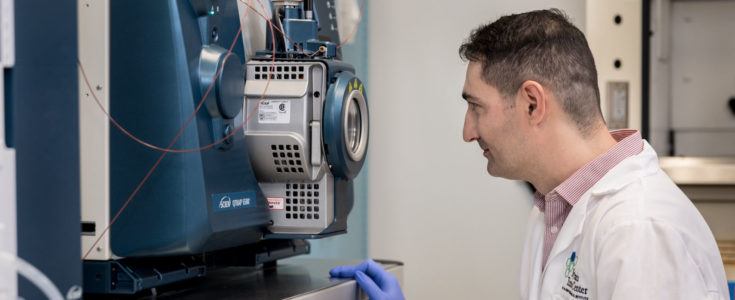Newsroom
Ivy Brain Tumor Center Awarded U.S. Department of Defense Grant to Advance Promising Glioblastoma Drug Candidate
PHOENIX, ARIZ, March 28, 2024 – The Ivy Brain Tumor Center at Barrow Neurological Institute received a $1.48 million, three-year U.S. Department of Defense (DoD) Impact Award to advance the development of MnP3. This novel redox-active agent shows potential in the treatment of glioblastoma. Successful completion of the project will have a significant impact on translating the drug to clinical use.

The grant was awarded to Artak Tovmasyan, PhD, principal investigator and pharmacokinetics core leader at the Ivy Center, and co-investigators An-Chi Tien, PhD, and Shwetal Mehta, PhD. Dr. Tovmasyan and his team developed the compound MnP3 with the goal of enhancing the sensitivity of glioblastoma cells to radiotherapy while simultaneously protecting normal brain tissue from side effects associated with radiotherapy. Preliminary studies with MnP3 have uncovered its potent radiosensitizing properties and have shown early indications of its neuroprotective properties. This grant will allow further development of this molecule, which can then be evaluated via the Ivy Center’s early-phase clinical trials program, testing novel therapies for brain cancer patients.
“Glioblastoma is the most prevalent and aggressive primary malignant brain tumor in adults with no curative treatment available. While standard radiotherapy serves to delay tumor progression, recurrence inevitably occurs, leading to patient mortality,” Dr. Tovmasyan says. “Furthermore, the damage inflicted on normal brain tissue by radiotherapy often results in cognitive deficits, significantly impacting the quality of life for brain tumor patients.”
The DoD funding will enable a thorough preclinical assessment of MnP3 in various glioblastoma models. The Ivy Center has developed multiple preclinical models that recapitulate the genetic and cellular complexities found in human glioblastoma tumors.
“MnP3 will go through rigorous testing in our preclinical core to ensure that this molecule is ready to be tested in a clinical setting,” says Dr. Mehta, deputy director and preclinical core leader at the Ivy Center.
Dr. Tien, pharmacodynamics core leader, will provide support in conducting pharmacodynamic analysis to discover specific biomarkers that can help identify the target population most likely to benefit from this treatment.
“The funding will help us in evaluating the radio-protective effects of MnP3 on neurocognitive function with the help of neurobehavioral assays in preclinical models,” Dr. Tien says.
“Through this DoD award, we aim to explore the translational potential of a novel manganese porphyrin-based SOD (superoxide dismutase) mimic for glioblastoma radiotherapy. With the support of the DoD award, we will validate these findings and delve deeper into identifying the specific subset of glioblastoma patients for whom this therapy would be the most effective, thereby laying the groundwork for further development toward clinical translation,” Dr. Tovmasyan says.
About Ivy Brain Tumor Center
Ivy Brain Tumor Center at Barrow Neurological Institute in Phoenix, AZ, is a tertiary care and nonprofit translational research program that employs bold, early-phase clinical trial strategies to identify new treatments for aggressive brain tumors, including glioblastoma. Our leading experts in neurosurgical oncology, neuro-oncology, radiation oncology, neuroradiology, neuropathology and neuroscience nursing treat more patients annually than any other brain tumor center in the United States. The Ivy Center’s Phase 0 clinical trials program is the largest in the world and enables personalized care in a fraction of the time and cost associated with traditional drug development. In addition, unlike conventional clinical trials focusing on single drugs, the Ivy Center’s accelerated program tests therapeutic combinations matched to individual patients. We leave no stone unturned in the pursuit of hope and healing. Learn more at IvyBrainTumorCenter.org. Follow the Ivy Brain Tumor Center on Facebook, Instagram, Twitter, and LinkedIn.


